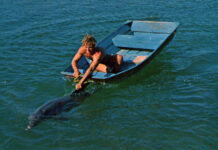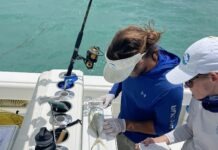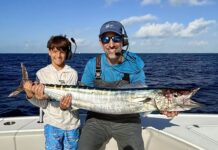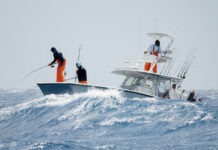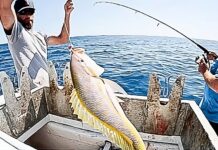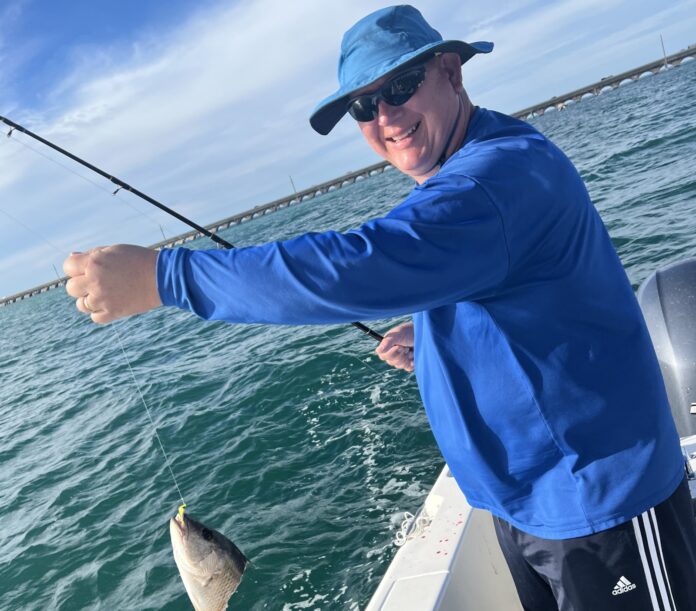
Biologists and anglers alike can agree that the Florida Keys fit the bill as one of the shark capitals of the world, with a healthy population and wide variety of sharks.
Love them or hate them, sharks are a very important part of our ecosystem, keeping food webs in balance and promoting biodiversity by feeding on species that are most numerous.
Lately, people seem to be more intrigued by sharks than ever before. They’re so popular that Shark Week on TV seems like it’s become Shark Month. Many people are terrified of sharks, but the reality is you have a much better chance of being struck by lightning. Typically sharks are more afraid of us than we are of them.
With that being said, we have had a few shark bites over the past few years in the Florida Keys. Some of the most recent attacks are from spear fishermen who are pursuing wounded fish or have speared fish attached to their stringer. In these rare instances, the sharks can be attracted by blood or movement of the wounded fish, and the diver who is attached to the fish stringer is arguably bitten by mistake.
However, there have been some instances where people were bitten without any harvested fish attached to them, including some widely publicized stories from Sombrero Lighthouse and Looe Key. Another shark story that doesn’t involve an attack, but shows the power of an apex predator, is that a few years ago, a local captain had clients specifically fishing for sharks in the Gulf of Mexico off the coast of Marathon. They hooked into a large tiger shark, and after a long fight, they got the shark boatside – only to have the shark vomit up an entire Key deer.
Living in the Florida Keys, and making a living from the Florida Keys tourism industry as I do, I realize that the last thing scuba and snorkel companies want me to write about is sharks and shark attacks, but they are the “elephant in the room.” I hope after reading this, that a tourist would have a better understanding of how we live and play in an ocean full of sharks.
I have a good friend who was attacked by a grizzly bear while elk hunting in Montana. I have a fishing client who was recently attacked by a mountain lion in Utah while hiking. Whether it’s a land predator or a shark in the Florida Keys, when you’re in the great outdoors, you must be conscious of these creatures’ existence and remember we are in their environment. The bottom line is that sharks are so quick and agile in the water compared to us that there’s no match.
Recently, I was giving a presentation on Florida Keys environmental issues to anglers at the Duck Key Fishing Club. I asked the audience to raise their hand if they’d ever had a game fish they were reeling in attacked by a shark. Every hand in the room went up, and the stories began. Many of the anglers in the room agreed that sharks seem to be getting braver and showing up more frequently.
When you encounter a shark problem while fishing, the best thing I can suggest is to get your game fish in quickly, but with finesse by lifting your rod slowly and reeling down quickly over and over again until the fish is landed. This technique seems to make your hooked game fish come up in a zigzag pattern that makes it a lot tougher for the shark to hit your game fish. I think the reason anglers have such a problem getting their game fish past a hungry shark is because our water in the Florida Keys is typically crystal clear and we have to use much lighter line to get our game fish to strike our baits. Because of this, we can’t horse the fish in like you can in many other areas. This is why I say you must bring your game fish up quickly, but with finesse or you’ll snap the line.
Today, shark harvesting is somewhat discouraged. Even though in Florida it’s still legal to keep one shark per person per day or two per vessel, there are several species that are off-limits to keep. If shark fishing from shore, you are required to complete FWC’s Shark-Smart Fishing course and get your Shore-based Shark Fishing Permit on top of your fishing license.
There are all kinds of theories on why the shark population in the Florida Keys has increased and why sharks have become more brave around boats and divers. Some people say that it’s because of new shark finning regulations in U.S. waters, where sharks were frequently harvested in the past to be sold overseas for shark fin soup. Some say it’s because “shark encounter”-type tours, where people dive with sharks and feed them by hand, are making sharks less scared of people and relate people and boats to feeding time.
Sharks and people live together. Rather than fearing them, be aware of them. If and when you encounter one, respect that you are in its environment and keep your distance. The shark will usually do the same.
To book a charter with Ana Banana, call or text Capt. Joel at 813-267-4401 or Capt. Jojo at 305-879-0564, or visit anabananafishing.com.












